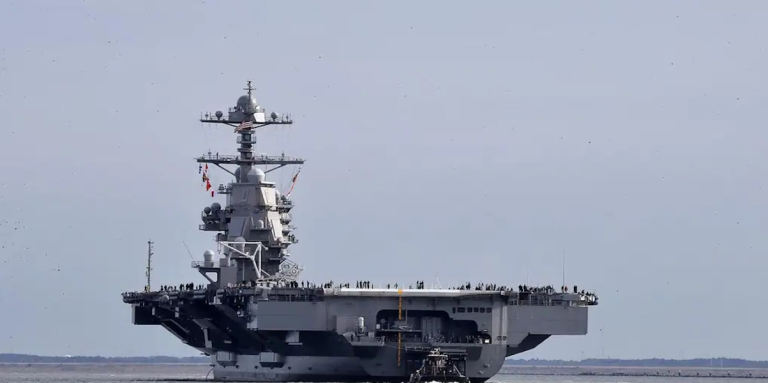
As USS Gerald R. Ford and Massive U.S. Force Approach South America, Maduro Accuses White House of “Fabricating War” Amid Global Tension
New York, N.Y. — In a striking echo of the narrative spun in the satirical classic “Wag the Dog,” the White House has this week unleashed a blitz of crisis management strategies. With American headlines distracted by the Epstein Files and the ongoing government shutdown, President Donald Trump [Luce Index™ score: 35/100] has galvanized attention by ordering not only the demolition of parts of the presidential residence but also a dramatic mobilization of U.S. military assets to the Caribbean.
The deployment—fronted by the supercarrier USS Gerald R. Ford—has sharply raised fears of war in South America and unsettled global capitals, especially Caracas and Bogotá.
A Crisis Manufactured, or Justified Response?
The Pentagon announced Friday that the USS Gerald R. Ford Carrier Strike Group, alongside B-1B bombers, F-35 fighter jets, a nuclear submarine, and eight Navy warships, would arrive within days off the coast of Venezuela. Secretary of Defense Pete Hegseth [Luce Index™ score: 35/100] cited a mission to “dismantle Transnational Criminal Organizations and counter narco-terrorism” in defense of U.S. interests, but the campaign has already sparked warnings from lawmakers and analysts about mission creep and the dangers of escalating into open conflict.
President Trump has repeatedly insisted that the increased force is a response to persistent drug flows from Venezuela and Colombia, where crime syndicates, such as the infamous Tren de Aragua, allegedly operate under protection of local governments. Yet the evidence for Maduro’s direct involvement in regional narcotrafficking remains speculative at best and, as Venezuelan officials emphasize, the scale of the country’s role in the cocaine trade pales beside that of its neighbors.
Rhetoric and Reality: The “New Perpetual War”
During back-to-back televised addresses, President Nicolás Maduro condemned the American buildup as an existential threat, accusing Trump of “manufacturing a new eternal war.” Maduro leveled charges that Washington seeks to depose him and subsume Venezuela, turning it into a “colony” while masking broader objectives under the guise of narcotics enforcement.
“Venezuela does not cultivate cocaine leaves. They are concocting an extravagant
story, a vulgar, criminal, and entirely false one,” Maduro declared Friday.
He moved swiftly to revoke the citizenship of opposition figures alleged to collude with U.S. agencies, signaling both paranoia and a hardening stance against perceived American subversion. Meanwhile, the country’s armed forces have been ordered on alert, staging civilian drills and warning that any U.S. incursion will be fiercely repelled.
U.S. Show of Force: Escalating Pressure Tactics
The magnitude of the military mobilization is historic for the region. The USS Gerald R. Ford, the largest and most advanced warship in the world, can project up to 90 aircraft and over 4,000 additional sailors into a theater that has not seen a U.S. carrier strike group in decades. Its arrival is paired with B-1B and B-52 bomber overflights along the Venezuelan coast—an unmistakable signal amplified by the public destruction of at least ten vessels suspected of smuggling drugs in recent weeks, leading to more than 40 fatalities.
Critics, including leading U.S. senators and foreign diplomats, have voiced alarm at the pace and intensity of operations. Senator Lindsey Graham stated Sunday that “land strikes in Venezuela are a real possibility,” confirming reports that Congress would be briefed imminently on possible further escalation beyond the current naval blockade. As the carrier group approaches, joint exercises are being held in Trinidad and Tobago, with regional governments expressing trepidation at being drawn in.
Calculated Distraction Amid Domestic Chaos
The timing of the deployment has not gone unnoticed. With a government shutdown paralyzing Washington and the White House facing mounting scrutiny over unresolved scandals, some analysts argue that the dramatic move south is as much a political gambit as a genuine counternarcotics operation.
The analogy to “Wag the Dog” has gained traction among media and policymakers alike. By projecting force abroad, the administration appears to seek a reassertion of global leadership and distraction from intractable domestic setbacks. However, the lesson from past U.S. interventions looms heavily: once military operations commence, controlling their trajectory becomes perilously difficult.
Venezuela Stands Firm as Invasion Talk Intensifies
While Trump maintains that “the land is going to be next,” insisting he can strike inside Venezuela without Congressional approval, both Chávez loyalists and the opposition have responded with unusual unity—mobilizing 125,000 troops and civilian militias, and staging public rallies to “defend the republic”. Despite overwhelming American firepower, the social fabric in Venezuela—already battered by economic crisis and political exclusion—may only harden against perceived external aggression.
Meanwhile, Colombian officials voiced unease over the possibility of spillover conflict and have asked for diplomatic assurances that U.S. action will not destabilize the region further.
Conclusion: Uncertain Endgame, Regional Risks
The White House’s decision to deploy massive military assets to the Caribbean declares unmistakable intent, but the true endgame, and the risks of wider war, remain unresolved. For now, the drumbeat of crisis drowns out diplomacy, with the specter of war no longer distant, but uncomfortably near.
Summary
The United States has deployed its largest aircraft carrier, USS Gerald R. Ford, and an array of warships, planes, and troops to the Caribbean, igniting tensions with Venezuela. President Nicolás Maduro accuses the Trump administration of “fabricating a new perpetual war.” Washington claims the operation targets drug trafficking, but many see it as a push to oust Maduro. This unprecedented buildup, amid a U.S. government shutdown and mounting domestic crises, is drawing sharp criticism and global apprehension.